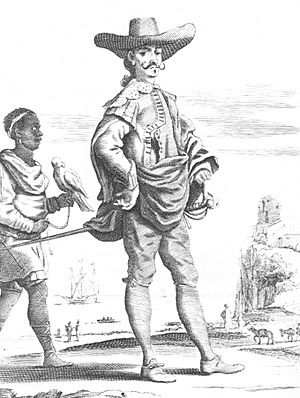- This page was last modified on 17 October 2025, at 10:18. Suggest an edit.
Hidalgo (nobility) facts for kids
An hidalgo is a special kind of nobleman from Spain or Portugal. The word is hidalga for a woman. In simple terms, an hidalgo was a nobleman who didn't have a big, fancy inherited title like "Duke" or "Count."
Hidalgos usually didn't have to pay taxes. However, they often didn't own much land or property.
Contents
What Does "Hidalgo" Mean?
The word hidalgo comes from an old Spanish phrase, fijo d'algo. This means "son of something." It was used to describe a person of importance.
In Portugal, a similar word, fidalgo, was used. In the old Kingdom of Aragon, a nobleman like an hidalgo was called an infanzón. Over time, the "f" sound in fijo changed to an "h" sound, giving us hidalgo.
The term eventually included lower-ranking nobles. These were people who didn't have titles but were still free from paying taxes. This was often because they served in the military.
How Hidalgos Started
The idea of the hidalguía (being an hidalgo) began with fighters during the Reconquista. This was a long period when Christian kingdoms took back land from Muslim rule in Spain.
By the 900s, the word infanzón was used for knights. These knights were often loyal to powerful lords or church leaders. They managed their lands as a kind of smaller nobility. In those early days, you could become a knight if you could afford a horse and military gear.
Around the 1100s, becoming a knight started to depend more on your family background. In new towns built on the frontier, knights became very important. They led society and politics. They also represented their towns when kings called meetings. It was during this time that these knights, along with the higher nobility, began to be called hidalgos.
Different Kinds of Hidalgos
There were different ways to be an hidalgo:
- Hidalgos de sangre: These were hidalgos "by blood" or family line. Their noble status was so old that no one remembered how it started. If someone questioned their nobility, they could go to court. If they proved their family had always been seen as noble, they got a special document.
- Hidalgo solariego: This was a very respected type of hidalgo. To be one, you had to prove that all four of your grandparents were hidalgos.
- Hidalgos de privilegio: These hidalgos got their title directly from the King of Spain. This was often a reward for special services.
- Hidalgo de bragueta: This was a unique type of hidalgo. A man could get tax exemption if he had seven sons born legally.
In some parts of Spain, like Asturias, the King would make lists every seven years. These lists classified people as either hidalgos nobles (who didn't pay taxes) or pecheros (who had to pay taxes). These lists are now helpful for studying family history.
Why the Title Lost Its Power
Over time, the hidalgo title became less important. Kings started giving out the title easily, often for personal favors. By the 1700s, many people had tax exemptions. This put a huge strain on the government, which needed money.
In the early 1800s, things changed a lot. Everyone, no matter their background, had to join the military if called. Hidalgos lost their special tax breaks and military exemptions. The old social classes began to blend. Only the very highest nobility and royalty kept some of their old privileges.
Hidalgos in Stories
In books, hidalgos are often shown as nobles who have lost most of their money. But they still try to keep their noble pride and traditions.
The most famous fictional hidalgo is Don Quixote. He is the main character in a famous Spanish novel by Miguel de Cervantes. Don Quixote is an hidalgo who loves reading about knights. He decides to become a knight himself, even though he is poor. He tries to live by a knight's code of honor, even when it doesn't make sense for his situation.
Another story, Lazarillo, features a very poor hidalgo. He is so poor that he puts breadcrumbs on his clothes to pretend he has eaten. His noble honor stops him from doing manual work, but it doesn't help him get food.
Henry Wadsworth Longfellow also wrote about an hidalgo in his poem "The Theologian's Tale." This story tells of an hidalgo who sadly betrays his two daughters.
See also
 In Spanish: Hidalgo para niños
In Spanish: Hidalgo para niños
- Cuban nobility
- Hidalgo (disambiguation)
- Principalía


